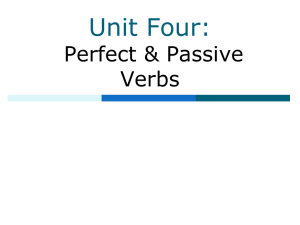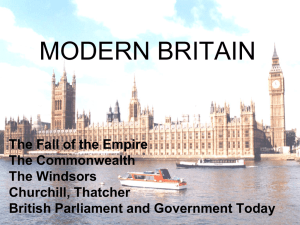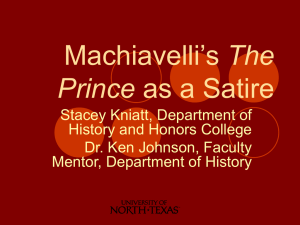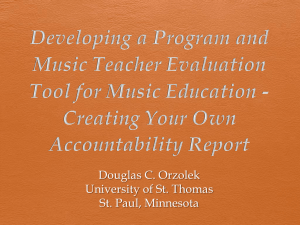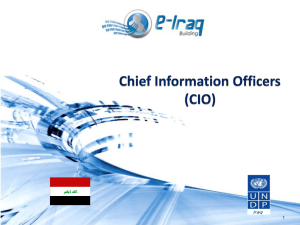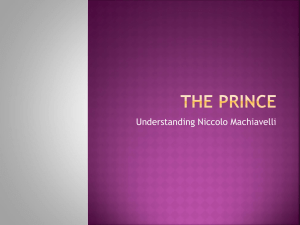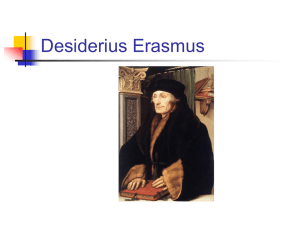Web_de_Teresa_files/LP Discussion Questions
advertisement
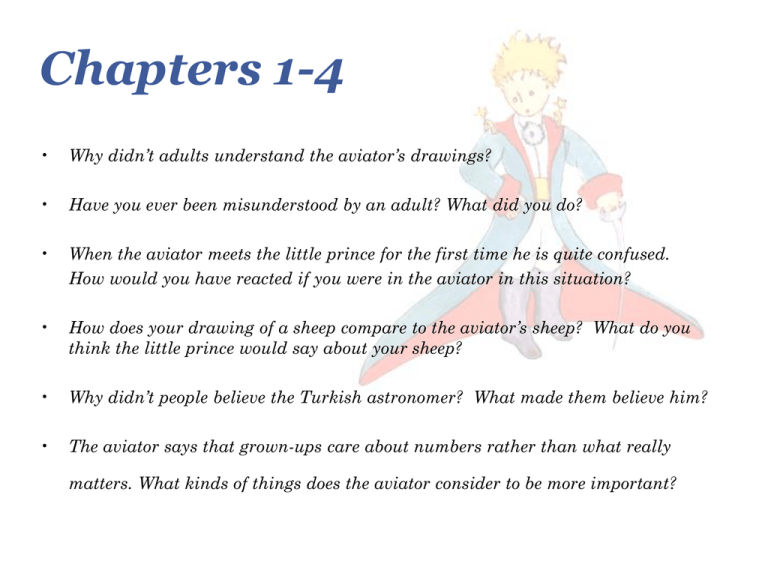
Chapters 1-4 • Why didn’t adults understand the aviator’s drawings? • Have you ever been misunderstood by an adult? What did you do? • When the aviator meets the little prince for the first time he is quite confused. How would you have reacted if you were in the aviator in this situation? • How does your drawing of a sheep compare to the aviator’s sheep? What do you think the little prince would say about your sheep? • Why didn’t people believe the Turkish astronomer? What made them believe him? • The aviator says that grown-ups care about numbers rather than what really matters. What kinds of things does the aviator consider to be more important? Chapters 5-9 • What are baobabs? • Why are the baobabs a problem for the little prince? • What does the little prince like to do on his planet for entertainment? • How is this activity different on his planet than on Earth? • Why does the little prince get angry with the aviator? • Describe the little prince’s flower. How does he feel about her? • What does the little prince do to prepare for his departure? Chapters 10-12 • Describe the king. • You’ve probably seen the word “subject” before, but how is it used in Chapter 10? • What kinds of commands does the king make? Why? • Describe the vain man. • What does it mean to be vain? • What other character was described as being vain? • The vain man gives the little prince a definition for the word “admire.” How does his definition compare to the actual definition? • Who is someone whom you admire? • What does the little prince say to himself after meeting each new character? • Why do you think he says this? • Describe the drunkard. • What is unusual about his reasoning? Chapters 13-15 • Describe the businessman. • The little prince says to himself about the businessman, “This man argues a little like my drunkard.” What does the little prince mean? • Why does the little prince think it’s silly for the businessman to own the stars? • How is it different from the little prince own his volcanoes and his flower? • Describe the lamplighter. • Why does the lamplighter dislike his job? • Describe the geographer. • Why does the geographer know so little about his own planet? • In your own words, what does ephemeral mean? • Why does it upset the little prince to learn that his flower is ephemeral? Chapters 16-20 • What animal does the little prince meet in the desert after landing on Earth? • What does this animal mean when it says, “Anyone I touch, I send them back to the land from which they came?” • What does the little prince continue searching for, without success? • What does the little prince discover about his flower while walking through the desert? • Why does the little prince begin to cry after leaving the garden? Chapters 21-24 • • • • • • • • According to the fox, why can’t he play with the little prince? Look up “tame” in the dictionary. Is this the same way it is used in the book? How are the definitions similar/different? How does the fox tell the little prince to tame him? After his encounter with the fox, why does the little prince decide that his rose is, in fact, different from all the other roses in the garden? What does the fox mean when he says, “One sees clearly only with the heart? The railroad switchman tells the little prince, “No one is ever satisfied where he is.” This is similar to a saying in English: “The grass is always greener on the other side of the fence.” What do you think this means? Do you have similar sayings in your native language? The little prince meets a man who sells pills that quench a person’s thirst. The salesman explains that they are useful because they save people time. Would you take these pills if they existed? Why or why not? What does the little prince mean when he says, “What makes a desert beautiful is that it hides a well somewhere”? Chapters 25-27 • • • • The aviator and the little prince finally find a well after searching for many hours. From your own experience, describe what it feels like to drink water after being thirsty for a long time. The little prince says, “…eyes are blind. You have to look with your heart.” How is this quote similar to another quote we read earlier? Which character taught him this? When the aviator finds the little prince sitting on the wall, he is talking to the snake once again. What are they discussing? Why does this upset the aviator? How does the little prince explain to the aviator that the stars are different for everyone? Does the idea apply only to stars? • What ultimately happens to the little prince? • What does the aviator realize he forgot to do? Why does this worry him? • What is the aviator’s final thought?

